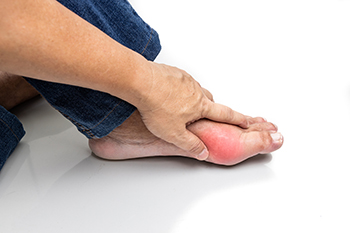
Gout is a form of inflammatory arthritis that causes painful flares typically lasting for a week or two. It most often affects the big toe, but also can develop in ankles. Gout is triggered by the accumulation of urate crystals in the joints, resulting from high levels of uric acid in the body, termed hyperuricemia. This can lead to crystal formation, though not everyone with elevated uric acid levels develops gout. The disease progresses through stages, including hyperuricemia, acute flares, periods of no symptoms, and, if untreated, crystal formation. Symptoms commonly include sudden intense pain, swelling, redness, and warmth in the affected joint. Gout attacks are often caused by certain foods, alcohol, medications, or other illnesses. Without proper management, gout can lead to complications, such as joint damage and associated health issues like hypertension, kidney disease, obesity, and heart problems. Risk factors for gout include genetics, diet, age, and gender. Menopause, alcohol consumption, and obesity may also be factors. Early diagnosis, diet and lifestyle changes, and treatment can significantly alleviate symptoms and prevent complications. If you are experiencing symptoms of gout in the big toe or ankle, it is suggested that you schedule a appointment with a podiatrist.
Gout is a painful condition that can be treated. If you are seeking treatment, contact one of our podiatrists from Grobowski Foot & Ankle. our doctors will treat your foot and ankle needs.
What Is Gout?
Gout is a form of arthritis that is characterized by sudden, severe attacks of pain, redness, and tenderness in the joints. The condition usually affects the joint at the base of the big toe. A gout attack can occur at any random time, such as the middle of the night while you are asleep.
Symptoms
- Intense Joint Pain - Usually around the large joint of your big toe, and it most severe within the first four to twelve hours
- Lingering Discomfort - Joint discomfort may last from a few days to a few weeks
- Inflammation and Redness -Affected joints may become swollen, tender, warm and red
- Limited Range of Motion - May experience a decrease in joint mobility
Risk Factors
- Genetics - If family members have gout, you’re more likely to have it
- Medications - Diuretic medications can raise uric acid levels
- Gender/Age - Gout is more common in men until the age of 60. It is believed that estrogen protects women until that point
- Diet - Eating red meat and shellfish increases your risk
- Alcohol - Having more than two alcoholic drinks per day increases your risk
- Obesity - Obese people are at a higher risk for gout
Prior to visiting your podiatrist to receive treatment for gout, there are a few things you should do beforehand. If you have gout you should write down your symptoms--including when they started and how often you experience them, important medical information you may have, and any questions you may have. Writing down these three things will help your podiatrist in assessing your specific situation so that he or she may provide the best route of treatment for you.
If you have any questions, please feel free to contact one of our offices located in Bellevue, Seattle, and Issaquah, WA, . We offer the newest diagnostic and treatment technologies for all your foot care needs.
